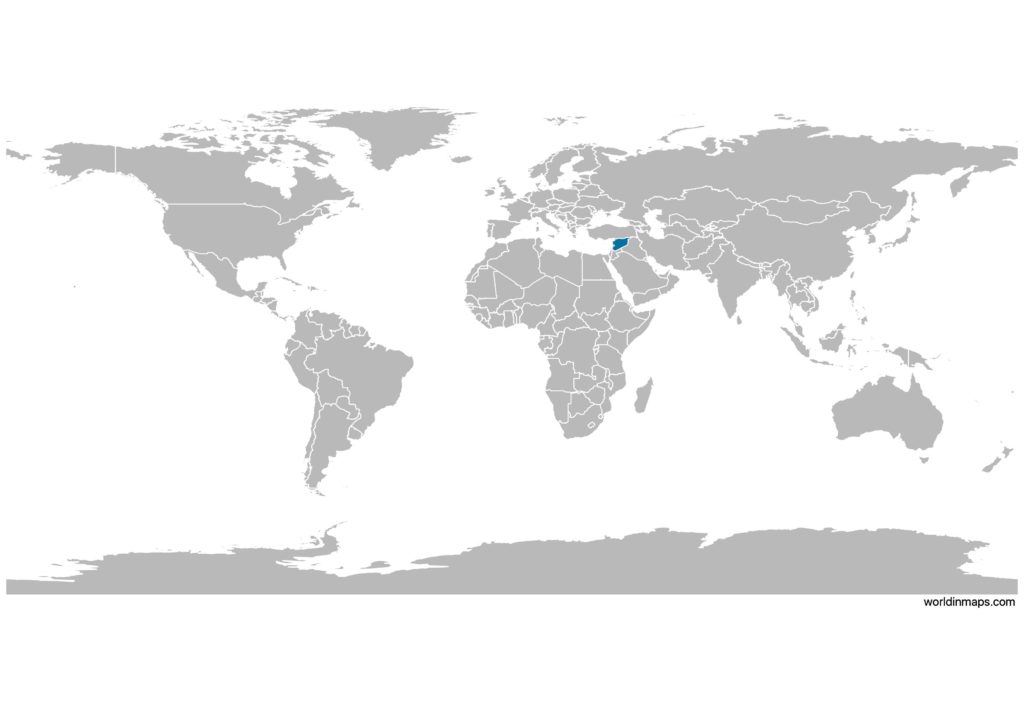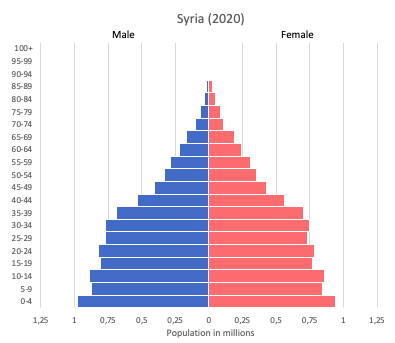Syria

| Government | |
| Name | Syrian Arab Republic |
| Arabic | الجمهورية العربية السورية al-Jumhūrīyah al-ʻArabīyah as-Sūrīyah |
| Government type | presidential republic – highly authoritarian regime |
| Capital | Damascus (1,711,000 (2004)) |
| Currency | Syrian pound (SYP) |
| People | |
| Population (2020) | 17,500,657 (66th) |
| Density of population | 118.3 P/km2 (70th) |
| Nationality | Syrian |
| Official languages | |
| Arabic | |
| Ethnic groups | |
| Arab | ~50% |
| Alawite | ~15% |
| Kurd | ~10% |
| Levantine | ~10% |
| other | ~15% |
| Religions | |
| Muslim | 87% |
| Christian | 10% |
| Druze | 3% |
| Jewish | few remaining in Damascus and Aleppo |
| Christian may be considerably smaller (they fled the country during the ongoing civil war) | |
| Life expectancy (2020) | |
| Male | 72.3 years |
| Female | 75.3 years |
| Total population | 73.7 years (143rd) |
| Homicides | |
| Total (2018) | 0.9 per 100,000 people (147th) |
| Geography | |
| Land area | 185,887 km2 |
| water area | 1,550 km2 |
| total area | 187,437 km2 (90th) |
| Lowest point | |
| unnamed location near Lake Tiberias | -208 m |
| Highest point | |
| Mount Hermon (Jabal a-Shayk) | 2,814 m |
| Land use (2011) | |
| Agricultural land | 75.8% |
| Arable land | 25.4% |
| Permanent crops | 5.8% |
| Permanent pasture | 44.6% |
| Forest | 2.7% |
| Other | 21.5% |
| Urbanization | |
| Urban population (2020) | 55.5% |
| Rate of urbanization | 1.43% annual rate of change (2015 – 2020) |
| Economy | |
| Labor force (2017) | 3.767 million (95th) |
| Labor force by occupation (2008) | |
| Agriculture | 17% |
| Industry | 16% |
| Services | 67% |
| Unemployment rate (2017) | 50% (217th) |
| GDP (PPP) (estimate 2015) | |
| Total | $50.28 billion |
| Per capita | $2,900 |
| GDP (nominal) (estimate 2014) | |
| Total | $24.6 billion (167th) |
| Per capita | $831 |
| GDP by sector (estimate 2017) | |
| Agriculture | 20% |
| Industry | 19.5% |
| Services | 60.8% |
| Exports (2017) | $1.85 billion (143rd) |
| Exports partners (2017) | |
| Lebanon | 31.5% |
| Iraq | 10.3% |
| Jordan | 8.8% |
| China | 7.8% |
| Turkey | 7.5% |
| Spain | 7.3% |
| Imports (2017) | $6.279 billion (119th) |
| Imports partners (2017) | |
| Russia | 32.4% |
| Turkey | 16.7% |
| China | 9.5% |
Syria on the world map

Syria is located in Asia and more specifically in the Middle East.
Syria top 10 largest cities (2004)
- Aleppo (2,132,100)
- Damascus (1,711,000)
- Homs (652,609)
- Latakia (383,786)
- Hama (312,994)
- Raqqa (220,488)
- Deir ez-Zor (211,857)
- Al-Hasakah (188,160)
- Qamishli (184,231)
- Sayyidah Zaynab (136,427)
Demography
Population pyramid

Age structure data
Estimate for 2020:
- 0-14 years: 33.47% (male 3,323,072/female 3,170,444)
- 15-24 years: 19.34% (male 1,872,903/female 1,879,564)
- 25-54 years: 37.31% (male 3,558,241/female 3,679,596)
- 55-64 years: 5.41% (male 516,209/female 534,189)
- 65 years and over: 4.46% (male 404,813/female 459,417)
Remark: the age structure of a population affects a nation’s key socioeconomic issues. Countries with young populations (high percentage under age 15) need to invest more in schools, while countries with older populations (high percentage ages 65 and over) need to invest more in the health sector. The age structure can also be used to help predict potential political issues. For example, the rapid growth of a young adult population unable to find employment can lead to unrest.
Population from 1950 to 2020
Source: United Nations, Department of Economic and Social Affairs, Population Division (2019). World Population Prospects 2019, Online Edition. Rev. 1.
Evolution of the life expectancy from 1960 to 2018
Source: World Development Indicators, The World Bank
Economy
Agriculture:
wheat, barley, cotton, lentils, chickpeas, olives, sugar beets; beef, mutton, eggs, poultry, milk
Industries:
petroleum, textiles, food processing, beverages, tobacco, phosphate rock mining, cement, oil seeds crushing, automobile assembly
Exports – commodities:
crude oil, minerals, petroleum products, fruits and vegetables, cotton fiber, textiles, clothing, meat and live animals, wheat
Imports – commodities:
machinery and transport equipment, electric power machinery, food and livestock, metal and metal products, chemicals and chemical products, plastics, yarn, paper
Time zone and current time in Syria
Go to our interactive map to get the current time in Syria